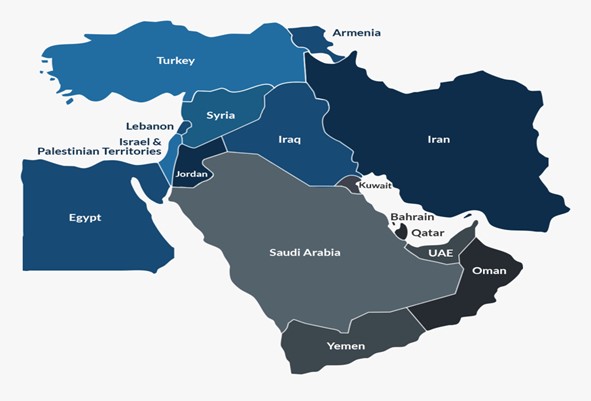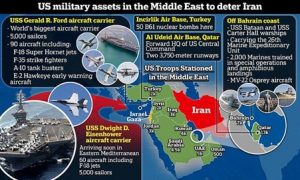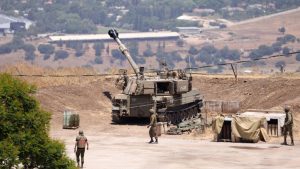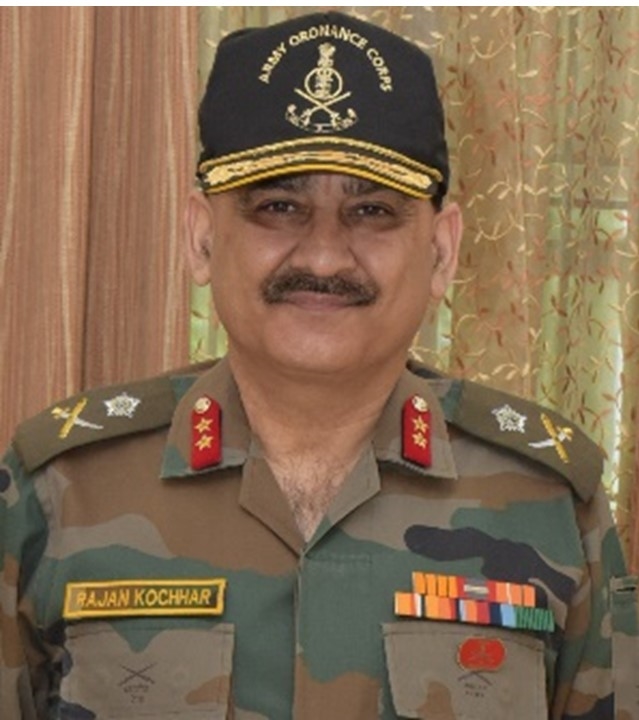THE SPIRALLING CRISIS IN THE MIDDLE EAST AND ITS IMPACT ON INDIAN GEOPOLITICS
- August 14, 2024
- Posted by: By Maj. Gen. Dr. Rajan Kochhar, VSM
- Categories: India, Middle East

Maj Gen (Dr) Rajan Kochhar (Retd)


The oft repeated idiom which we hear today that, “This is not an Era of War”, seems to have become irrelevant in the context of the overall war scenario in the World today. There are seven major conflicts happening around us, prominent amongst those being the Russia-Ukraine war, Gaza War, internal conflicts in Sudan, violence in Myanmar, turmoil in Syria and so on. We could also see the China-Taiwan conflict and the situation at LAC with China emerging as the conflicts of the future. Therefore, it would be correct to say that “This indeed is an Era of War.”
Why Nations go to War
At times it is quite intriguing to analyse why nations go to war. It is quite apparent that wars do not spare either the victor or the vanquished. As we see today with the advancement of technology, the strategy of war fighting has undergone a paradigm shift, and a great media perception has been evolved to target the mind and resolve of the enemy. We have also seen the re-alignment of the World from unipolar to a multi-polar dimension with superpowers being a party to any major conflict. A new trend which has been seen is that though wars are easy to start but culmination is becoming difficult as the two recent examples of Ukraine and Gaza suggest.
Conflict resolution towards, “Dialogue and Diplomacy” has taken a hit. The two major factors which have emerged is gaining absolute power towards hegemony and the other being vengeance towards your adversary. At times this vengeance borders down to hate emanating from religious and ideological differences. The other important aspect is the absence of matured and astute leadership with a lack of tolerance and understanding towards each other. We have often seen leaders with strong personalities leading nations into battle and then not able to decide when to stop. We also see a large disparity in the Global North and the Global South in concurrence of issues which largely affect the wellbeing of the polity of nations.
Spiralling Crisis in the Middle-East


Before we analyse the spiralling crisis in the middle-east, it would be important to understand the geo-strategic importance of this region. The Middle East serves as the connective tissue of the continents of Europe, Africa and Asia. Located within this global crossroads lies some of the world’s most importance trade routes and military chokepoints, including the Suez Canal, the Turkish Straits, the Straits of Hormuz, and the Straits of Gibraltar. Coupled with this are the availability of abundant resources of oil and energy. Therefore, there is no wonder that US and its allies has nine military bases in this region with deployment of over 50000 of its troops.
The present crisis in middle-east is not confined to one region. It initially started from Gaza and then moved on to the general area of Red Sea as well as South Lebanon. The axis of resistance triad of Hezbollah, Houthis and Hamas have activated their cadre in their respective areas of influence duly supported by Iran. There has been a major impact on sea trade as at present, around 40 container ships still sail through the Red Sea every day, compared to an average of well over 100 ships last year.


The war now seems to be shifting to South Lebanon. The Israeli army began to move troops near the border area with Lebanon amid military exercises simulating a war in the Arab country, according to Israeli media. The army published footage of its military exercises in preparation for a possible full-blown war with the Lebanese group Hezbollah. A military statement said the Golani Brigade’s 12th Brigade carried out a drill simulating fighting in complex terrain. The army’s 55th Reserve Paratroopers Brigade also carried out a military drill that included various combat scenarios, including movement in complex terrain and advancing along a “mountainous route,” the military said. Israeli Channel 12 reported that the army began to move its forces toward the north near the border with Lebanon amid an escalation of tensions along the Israeli-Lebanese border.
Impact on Indian Geopolitics
The Middle East crisis encompasses various conflicts and geo-political tensions in the region and has significant implications for India across several dimensions.
Economic Impact.
India is heavily dependent on Middle East countries for its oil imports. Qatar Energy has recently signed a 20-year LNG SPA with India’s Petronet LNG. The deal ensures the supply of 7.5 mtpa of LNG to India, bolstering the country’s energy security. Under the SPA, starting in May 2028, Qatar Energy will deliver the contracted LNG volumes ex-ship to various terminals in India using its extensive LNG fleet. The stakes are therefore high for India and any instability in this region can lead to major disruptions affecting India’s security and economic stability.
Strategic Partnerships.
India has strategic partnerships with countries like Saudi Arabia and the UAE in areas such as defence, counter-terrorism and infrastructure development. Instability can hinder these collaborations.
Diaspora Concerns.
Of the estimated 1.34 crore Non-Resident Indians, more than 66 per cent are in the Gulf countries of UAE, Saudi Arabia, Kuwait, Qatar, Oman and Bahrain. Crisis in this area can lead to job losses, displacement and challenges in repatriation affecting the livelihood of many Indian families.
Regional Security Dynamics.
The geo-political tensions in the Middle East can lead to the rise of extremist groups. The geo-political tensions involving major powers like US, Russia and China can have ripple effects on regional security dynamics influencing India’s strategic calculations.
Gazing into the Future
It is very difficult to accurately predict how the situation in Gaza, Lebanon and the Red Sea would get resolved in the near future. The best possible option seems to be some kind of re-alignment between the US and Iran. It is also quite apparent that most of the Arab nations do not see Iran as in a favorable manner due its policies in Iraq, Syria and the Arab Gulf region as well as due to its nuclear program. Therefore, in recent times we have seen a shift in Iran’s foreign policy towards Russia and China. The recent elections in Iran will also not cause any considerable shift in this policy. The Palestinian issue also would remain contentious since Israel is unlikely to reconcile to accept a two state solution. Therefore, we will have to brace for tough times ahead and develop alternatives to reduce dependence on the middle east and work towards self-reliance.


Maj Gen (Dr) Rajan Kochhar (Retd)
Author
Maj Gen Rajan Kochhar, VSM, retired from the Indian Army, as Major General Army Ordnance Corps, Central Command, after 37 years of meritorious service to the Nation. Alumni of Defence Services Staff College and College of Defence Management, he holds a doctorate in Management and is a reputed expert on defence modernisation, logistics and supply chain management. Gen Kochhar, a prolific writer and defence analyst, has authored four books and invited as an expert commentator by various news TV channels. His latest book, “Breaking the Chinese Myth” is a best seller on Amazon. He is a Senior Adviser with Defence Research and Studies and Indic Research Forum and Member, Manoj Parikkar Institute of Defence and Strategic Analyses, New Delhi, United Services Institution and Centre for Joint Warfare Studies, New Delhi.
